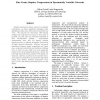Free Online Productivity Tools
i2Speak
i2Symbol
i2OCR
iTex2Img
iWeb2Print
iWeb2Shot
i2Type
iPdf2Split
iPdf2Merge
i2Bopomofo
i2Arabic
i2Style
i2Image
i2PDF
iLatex2Rtf
Sci2ools
ICDCS
2005
IEEE
2005
IEEE
Fine-Grain Adaptive Compression in Dynamically Variable Networks
Despite voluminous previous research on adaptive compression, we found significant challenges when attempting to fully utilize both network bandwidth and CPU. We describe the Fine-Grain (FG) Mixing strategy that compresses and sends as much data as possible, and then uses any remaining bandwidth to send uncompressed packets. Experimental measurements show that FG Mixing achieves significant gains in effective throughput, particularly at higher network bandwidths. However, non-trivial interactions between system components and layers (e.g., compression algorithms and middleware settings such as block size and buffer size) have significant impact on the overall system performance. Finally, the trade-offs and performance profiles of FG Mixing are measured, observed, and found to be consistent over a wide range of combinations of compression algorithms (GZIP, LZO, BZIP2), workload compression ratios (from 1 to 4), and network bandwidth (from 0 to 400 Mbps).
Compression Algorithms | Distributed And Parallel Computing | FG Mixing | ICDCS 2005 | Network Bandwidth |
Related Content
| Added | 24 Jun 2010 |
| Updated | 24 Jun 2010 |
| Type | Conference |
| Year | 2005 |
| Where | ICDCS |
| Authors | Calton Pu, Lenin Singaravelu |
Comments (0)

